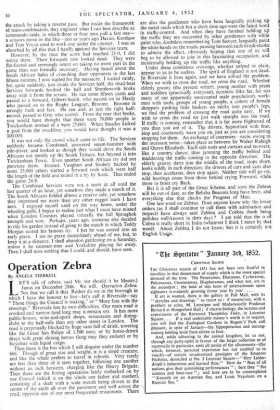Operation Zebra
By ANGELA THIRKELL
LET'S talk of zebras, said Mr. (or should it be Messrs.) Janus on December 28th. We will. Operation Zebra. Not that we call it that. Rather do we in the borough in which I have the honour to live—let's call it Riverside—say " Those things the Council is making," or " More fuss with the crossings." Riverside has its own difficulties. Our main road is crooked and narrow (and long may it remain so). It has more public-houses, wine-and-spirit shops, restaurants and dining- clubs to the half-mile than any other street in London. The road is perpetually blocked by huge vans full of drink, towering like the Great San Felipe of 1,500 tons; or by horse-drawn drays with great shining horses (long may they endure) or by bicyclists with liquid cargo. Then there is the bus which I will disguise under the number 666. Though of great size and weight, it is a timid creature, and like the whale prefers to travel in schools. Very rarely are less than three of it seen together, following one another without an inch between, charging like the Heavy Brigade. Then there are the boring operations lately embarked on by our Council (which is on the whole our father and mother), consisting of a shaft with a wide mouth being driven to the centre of the earth all over the pavement and well across the road, opposite one of our most frequented restaurants. There are also the gentlemen who have been languidly picking up the metal studs which but a short time ago were the latest word in traffic-control. And when they have finished holding up the traffic they are succeeded by other gentlemen with white paint who, doubtless remembering Tom Sawyer, languidly paint the white bands on the roads, pausing between each brush-stroke to admire the effect, obviously hoping that one of us will beg to be allowed to join in this fascinating occupation; and incidentally holding up the traffic like anything.
Under these conditions crossings, whether striped or plain, appear to us to be useless. The spirit of England is not dead. In Riverside it lives again, and we have solved the problem. When we wish to cross the road, we cross the road. Whether elderly granny (the present writer), young mother with pram and toddlers (practically everyone), eccentric (like far, far too many of our apparently unoccupied male population), work- men with tools, groups of young people, a cohort of female shoppers pushing little baskets on sticks into people's legs, we find the problem of crossing the road quite easy. If we wish to cross the road we just walk straight into the road. If traffic is coming, remember that it is far more frightened_of you than you are of it. The drivers, hypnotised with fear, stop and courteously wave you on, just as you are considering stopping for them. An exchange of courtesies—mute, owing to the incessant noise—takes place as between Sir Walter Raleigh and Queen Elizabeth. Each side nods and curtsies and recovers, like a country dance; _thus jamming the traffic behind and maddening the- traffic coming in the opposite direction: The elderly granny darts into the middle of the road, stops short, looks wildly in each direction; the drivers of cars and vans also stop, then accelerate, then stop again. Neither Side will go on; wild hootings come from those behind crying Forward, while those in front cry Back.
But it is all part of the Great Scheme, and soon the Zebras will be out of date, as the Belisha Beacons tong have been, and everything else that checks the' Progress of Man.
One last word on Zebras. Does anyone know why the lower orders .(as I shall continue to call them with admiration and respect) have always said Zebbra and Cobbra (both being polishes well-known in their day) ? I am told that the o of Cobra is really short in India (whatever I think I mean by that word). About Zebbra I do not know; but it is certainly not English Usage.






































 Previous page
Previous page